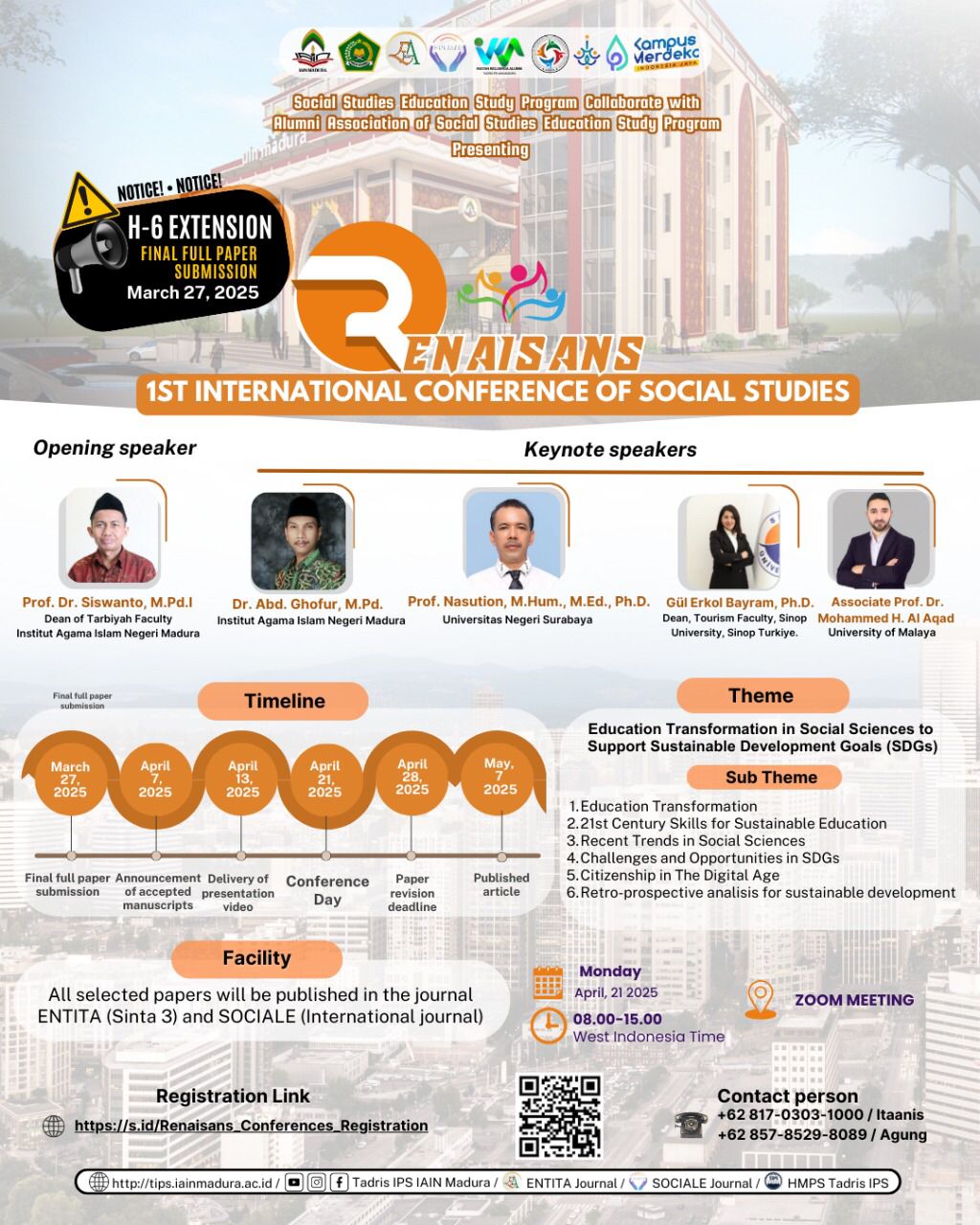Transformasi Edu Literasi melalui Novel Anak: Integrasi SDGs dan Pembentukan Pola Pikir Sistemik dalam Pendidikan Guru
 Abstract views: 3
,
Abstract views: 3
,
 PDF (Bahasa Indonesia) downloads: 2
PDF (Bahasa Indonesia) downloads: 2
Abstract
This study explores the implementation of children's novels as a medium to integrate Sustainable Development Goals (SDGs) values into teacher education. It aims to examine the extent to which children's novels can enhance reading interest, internalize sustainability concepts, and foster systemic thinking among prospective educators. The methods used include interviews, observations, and theoretical analysis based on Literacy Transformation, UNESCO guidelines, and a Systems Thinking approach. The findings show that the use of children's novels significantly boosts reading engagement and effectively connects theory with practice through contextual and emotional narratives. Children's novels also prove effective in fostering a deep understanding of social justice, equality, and environmental sustainability. Despite challenges such as limited teacher training and curriculum integration, the study highlights the strategic potential of children's novels in shaping critical, creative, and systemic educators. The results recommend strengthening story-based literacy programs and providing teacher training focused on integrating sustainability values to enrich learning in teacher education programs.
Downloads
References
Alatas, M. A., & Albaburrahim. (2021). Penggunaan Teknik Modelling Digital untuk Meningkatkan Kemampuan Membaca Puisi. Jurnal Ibriez : Jurnal Kependidikan Dasar Islam Berbasis Sains, 6(2), 177–192. https://doi.org/https://doi.org/10.21154/ibriez.v6i2.160
Alatas, M. A., Effendy, M. H., Desiana, A. Y., & Nisa’, H. H. (2024). Implementasi Kurikulum Merdeka pada Muatan Lokal Bahasa Madura di MI Kabupaten Pamekasan : Pendekatan Ekologis dalam Pendidikan Karakter dan Budaya. Ghâncaran: Jurnal Pendidikan Bahasa Dan Sastra Indonesia Special, Special Ed(November), 363–375. https://doi.org/10.19105/ghancaran.vi.17359
Ashoumi, H., & Yusuf, M. A. (2024). Pendidikan Inklusi : Integrasi Konsep Konstruktivistik Vygotsky dan Landasan Al-Qur ’ an untuk Mendukung SDGs 4. 14(3), 321–344. https://doi.org/10.33367/ji.v14i3.6308
Cordova, M. (2024). Integrating sustainable development goals in English language and literature teaching. Frontiers in Education, 9(February), 1–8. https://doi.org/10.3389/feduc.2024.1330034
Firdaus, B. N. S. I., & Nugraheni, N. (2024). Penguatan Pendidikan Karakter Sebagai Wujud Pendidikan Berkualitas Dalam Upaya Mencapai Tujuan Sustainable Developments Goals (Sdgs). Jurnal Citra Pendidikan, 4(2), 1788–1798. https://doi.org/10.38048/jcp.v4i2.3623
Kusumawati, H., & Alatas, M. A. (2024). Penerapan Kontruksi Ekologis dalam Pembelajaran Bahasa dan Sastra Indonesia pada Siswa di MA Ummul Quro Putri Pamekasan. Ghâncaran: Jurnal Pendidikan Bahasa Dan Sastra Indonesia, Special Ed, 549–562. https://doi.org/10.19105/ghancaran.vi.17777
Mahpudoh, M., Wellem, K. A., Septriani, S., Annisa, A., Putri, Z. D., Wulandari, R. R., … Fajri, M. E. (2024). Sastra Anak. Padang: CV. Gita Lentera.
Manurung, R. T., Saputra, N., Oktaviani, R., Nurmalina, N., Herman, H., Thao, N. Van, & Batubara, J. (2024). Improving Students’ Awareness about Sustainable Development Goals (SDGs) through Literary Text: A Case on Language Teaching. Library of Progress-Library Science, Information Technology & Computer, Vol 44(Issue 2), p493.
Muchsin, H. (2021). Peluang Dan Tantangan Perguruan Tinggi Menghadapi Revolusi Digital Di Era Society 5.0. Prosiding Seminar Nasional Pendidikan, 350–355.
Munandar, A. (2017). Prosiding Seminar Nasional Pendidik dan Pengembang Pendidikan Indonesia dengan Tema "Membangun Generasi Berkarakter Melalui Pembelajaran Inovatif. 2(January), 130–143.
Nurhadi, A., & Alatas, M. A. (2024). Increasing the Understanding of Islamic Education Material through Discovery Learning for 7th Grade Students at SMP Ibnu Cholil Bangkalan. Ghuru: International Journal of Teacher Education, 1(1), 1–15.
Prof. DR. Lexy J. Moleong, M. A. (2018). Metodologi Penelitian Kualitatif (Edisi revi). Bandung: PT Remaja Rosdakarya, 2018.
Rachmayanti, I., & Alatas, M. A. (2023). Pemanfaatan AI sebagai Media Pembelajaran Digital dalam Foreign Language Development Program (FLDP) IAIN Madura. GHANCARAN: Jurnal Pendidikan Bahasa Dan Sastra Indonesia, (November), 214–226. https://doi.org/10.19105/ghancaran.vi.11752
Ratna, N. K. (2004). Teori, Metode, dan Teknik Penelitian Sastra. Yogyakarta: Pustaka Pelajar.
Rini, P. P., Dahlia, I., Suherman, & Sholih. (2024). Perspektif Baru dalam Manajemen Pendidikan: Menangani Isu Kontemporer dengan Pendekatan Multidisipliner. Pendas: Jurnal Ilmiah Pendidikan Dasar, 9(2), 3236–3247.
Rizam, M. M., & Ayuanita, K. (2024). Kajian Ekologi Cerpen Digital Berbasis Web dan Implementasinya. (November), 451–462. https://doi.org/10.19105/ghancaran.vi.17362
Rosyidi, U. (2020). Merdeka Belajar ; Aplikasinya dalam Manajemen dalam Seminar Nasional Pasca Sarjana UNJ. Universitas Negeri Jakarta.
Sugiyono. (2019). Metode Penelitian Kuantitatif, Kualitatif, dan R&D. Bandung: Bandung: Alfabeta.
Sumitro, E. A., & Puniman, P. (2024). Implementasi Pendidikan Karakter melalui Pembelajaran Sastra di Sekolah Menengah Atas. 12(2), 113–120. https://doi.org/10.31571/bahasa.v13i2.8255
Zorba, M. G., Şahhüseyinoğlu, D., & Arikan, A. (2024). Reading Harry Potter: A Journey into Students’ Understanding of Sustainable Development Goals. Sustainability (Switzerland) , 16(11), 1–22. https://doi.org/10.3390/su16114874
Zuaebun, I. Z. (2025). Analisis Wacana di Kelas 5 Sekolah Dasar Islam Elhakim : Pendekatan Linguistik dalam Pembelajaran Bahasa Indonesia. 0–2.
Copyright (c) 2025 Entita: Jurnal Pendidikan Ilmu Pengetahuan Sosial dan Ilmu-Ilmu Sosial

This work is licensed under a Creative Commons Attribution-NonCommercial 4.0 International License.
ENTITA: Jurnal Pendidikan Ilmu Pengetahuan Sosial dan Ilmu-Ilmu Sosial operates an Open Access policy under a Creative Commons Non-Commercial 4.0 International license. Authors who publish with this journal agree to the following terms:
- The copyright of the received article once accepted for publication shall be assigned to the journal as the publisher with licensed under a

- Journal is able to enter into separate, additional contractual arrangements for the non-exclusive distribution of the journal's published version of the work (e.g., post it to an institutional repository or publish it in a book), with an acknowledgement of its initial publication in this journal.
- Journal is permitted and encouraged to post their work online (e.g., in institutional repositories or on their website) prior to and during the submission process, as it can lead to productive exchanges, as well as earlier and greater citation of published work (see The Effect of Open Access).
- Here is Copyright Transfer Form that author can download and send to OJS during submission.

















